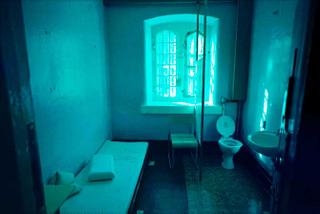The Lonesome

There is something startling about being alone. Once you've grown accustomed to the habits, however unlike your own, of another person, spending time away from them reawakens a longing for companionship. A nascent want to be unified. A desire for the secure feeling of community. A deeper appreciation of being understood and wanted.
Solitude sheds light on one's anonymity. I was listening to the news the other day and the question was posed: "Do we have the right to be anonymous?" Of course we do, but to exercise this right is like exercising the right to be obese or exercising the right to not bathe. It is a very strange epiphany to realize that you've not spoken to another person in two days, or that no one has seen your face for a week, or should you fall down and break your back it would be days before anyone would miss you.
Unless you've grown up a hermit or have a schizoid personality and don't enjoy the company of others, being alone enforces the innate social drive we had even before we were even human. Look at primate species, most of them fall into one of two groups: those with a constant mate and those with a colony. Even outcast male gorillas form coup de jungla groups that aid each other in the forceful overthrow of a silverback so that one of them may appropriate the fallen silverback's harem. Even outcasts and pariahs rarely choose to exist on their own.
Solitude is a form of death, a type of death that does not involve grief, wakes, or burials. It is a living death. It is death in that we are allowed to peer into that vacancy we cannot escape. As they say, the only certainty in life is death. One enters this life anonymously, even unknown to oneself, however, no one should leave life anonymously. To do so would to be overlooked by fate, to have left a mark on nothing, not even the things you thought you touched.

Perhaps the solitary elderly tire of living not because the world has lost its novelty, but because the fear of being alone, of being removed from the social human chain, is a crippling fear. Oftentimes, these people long to die and go to heaven, or maybe even hell, because there will be others. Nobody ever thinks of heaven as a place where you can finally be alone.
Nietzsche said that people fear solitude because it forces them to cogitate on themselves, and they rarely like what they find. What do they find? That they are a shell without others? That everything they base their beliefs on is contingent upon beliefs suggested by others? (Don't believe me? Can ideas like racism, democracy, and justice exist in a society of one?)That there is no such thing as individuality because it takes a comparison to others for difference to be recognized? That even the most countercultural movement is focused not on isolating itself from society but on drawing society's attention inward to people who feel they've been overlooked?
Even the most degenerate sociopaths cannot escape the uneasiness of being alone. Criminals are put in solitary confinement as punishment, not because this is the only place where they can't harm others, but because this is a simulacrum for being forgotten. It is the fear of being forgotten-the fear that a day goes by when somebody doesn't think of you, the fear that we are not loved unless we're in the presence of the lover, the fear that you cease to exist as soon as everyone you know forgets your name and face-that frightens us the most.


1 Comments:
This is probably the most amazingly beautiful thing I've ever had the pleasure of reading by you.
On the note of being alone, there is a natural drive for community; it is innate, as you stipulate. The drive for solitude emanates sheerly from the community that creates it. It occurs ad hoc, I guess; it is never born, or congenital.
Great post.
Post a Comment
<< Home